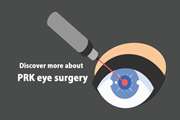What causes corneal ulcers?
A corneal ulcer typically occurs due to an infection in the corneal tissue. However, other conditions such as severe dry eye can also lead to the formation of a corneal ulcer. It's important to understand that healing from this condition may take several weeks or even months. Please be patient and follow your doctor's treatment plan closely.
Endophthalmitis: A Serious Eye Infection
Endophthalmitis is an infection of the clear fluids inside your eye. This infection can cause serious damage because it directly affects the tissues inside your eye. That's why it's important to prevent it, and if it does happen, to diagnose and treat it quickly. Endophthalmitis is a serious condition that can lead to vision loss if not treated promptly. If you experience any symptoms of endophthalmitis, seek medical attention immediately.
Discover more about PRK eye surgery
PRK, or photorefractive keratectomy, is a type of laser eye surgery used to correct refractive errors such as nearsightedness, farsightedness, and astigmatism. Due to its proven safety profile, PRK is often considered the preferred method for correcting refractive errors.
Key Points you know about refractive surgeries
Refractive surgery is a medical procedure that reshapes the cornea of the eye using lasers or other surgical tools to correct refractive errors. By doing so, the need for glasses or contact lenses is minimized, and individuals can see distant and near objects clearly.
Protect yourself from dengue fever: Here's how
To effectively prevent dengue, community efforts must focus on both personal protection against mosquito bites and environmental measures to control mosquito breeding.
World Hepatitis Day 2024
A Silent Threat, It Is Time to Action
The World Health Organization has designated July 28th as World Hepatitis Day to raise awareness about this disease, encourage vaccination, promote early diagnosis, and facilitate effective treatment for hepatitis. Early detection of hepatitis is crucial as prompt treatment can prevent the disease from progressing to cirrhosis or liver cancer.
World Glaucoma Week
Glaucoma: Early Detection, Lifelong Vision
The primary cause of glaucoma is increased pressure inside the eye. This pressure, known as intraocular pressure, damages the optic nerve. One of the most insidious aspects of glaucoma is that it often progresses without noticeable symptoms in its early stages. Early detection is crucial in managing glaucoma. While there is no cure for glaucoma, early detection and treatment can significantly slow down or even stop the progression of the disease. Regular eye exams are essential, especially for those at higher risk. Farabi Hospital's ophthalmology department is renowned for delivering cutting-edge treatments and unparalleled care to patients with glaucoma.

 Thyroid Eye Disease
Thyroid Eye Disease





